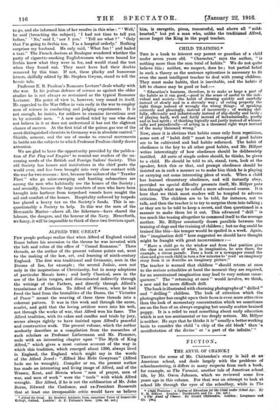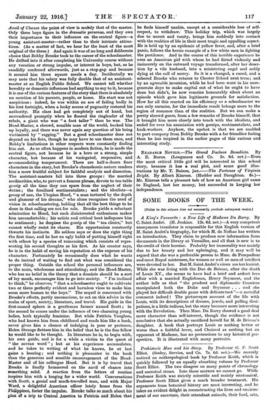FICTION.
THE ANVIL OF CHANCE.?
Mown the scene of Mr. Chittenden's story is laid at an American school, and deals largely with the problems of schoohnastering, it differs in many respects from such a book, for example, as The Varmint, another tale of American school_ life, by Mr. Owen Johnson, which we reviewed some five years ago in this column. For that was an attempt to look at school life throUgh the eyes of the schoolboy, while in The • Child Training : a System of Education for the Child under School Aye.: Aly V. M. HIllyer. London : Duckworth and Co. [5s. net.] COThe Anvil of Chance. By Gerald Chittenden. London,: Loagmarur aad . Lee.1 Anvil of Chance the point of view is mainly that of the master. Only three boys figure in the dramatis personae, and they owe their importance to their influence on the central figure—a young assistant-master—rather than to their intrinsic attrac- tions. (As a matter of fact, we hear far the least of the most original of the three.) And again it was of no long and deliberate choice that Bobby Brooke took to the career of the schoolmaster. He drifted into it after completing his University course without any vocation or strong impulse, or interest in boys, but, as he candidly confessed afterwards, just as a stop-gap and because it secured him three square meals a day. Incidentally we may note that his salary was fully double that of an assistant- master at an English Public School. We cannot tell whether heredity or domestic influences had anything to say to it, because it is one of the curious features of the story that there is absolutely no mention of his parents, people, or home. His start was not auspicious : indeed, he was within an ace of failing badly in his first fortnight, when a lucky access of pugnacity restored his authority. His class had got completely out of hand, but surrendered promptly when he floored the ringleader of the rebels, a giant who was " a foot taller " than he was. The Head-Master, a shrewd, sensible man of the world, backed him up loyally, and there was never again any question of his being victimized by " ragging." But a good schoolmaster does not depend on his fists, though he may have to use them once, and Bobby's limitations in other respects were constantly finding him out. As so often happens in modern fiction, he is made the central figure, not because he is a hero or a strong, simple character, but because of his variegated, responsive, and accommodating temperament. There are half-a-dozen finer characters in the story, but Brooke's chameleonic nature renders him a more fruitful subject for faithful analysis and dissection. The assistant-masters fall into three groups : the married mediocrities, who, to pervert a famous phrase, devote to tea-table gossip all the time they can spare from the neglect of their duties ; the fossilized sentimentalists ; and the idealists—a group of one, the Utopian Hood, " a man tortured by the depth and glamour of his dreams," who alone recognizes the need of vision in schoolmastering, holding that all the best things to be done in that calling are not for sale. Brooke yields a reluctant admiration to Hood, but such disinterested enthusiasm makes him uncomfortable ; his satiric and critical bent indisposes him to sentiment ; he despises the gossip of the " tea clinics," but cannot wholly resist its charm. His opportunism constantly thwarts his instincts. He seldom says or does the right thing the first time, and he has an ugly habit of putting himself right with others by a species of romancing which consists of repre- senting his second thoughts as his first. As his creator says, he is in the habit of saving his reputation at the expense of his character. Fortunately he occasionally does what he wants to do instead of waiting to find out what was considered the proper thing. Outside the school the personal influences are, in the main, wholesome and stimulating; and the Head-Master, who has no belief in the theory that a dom inie should be a sort of lay monk, encourages him to go into society. " I'm inclined to think," he observes, " that a schoolmaster ought to cultivate two or three perfectly evident and harmless vices to make him seem more human to the boys." The sequel is concerned with Brooke's efforts, partly unconscious, to act on this advice in the realm of sport, society, literature, and travel. His guide in the first-named sphere is a gentleman farmer named Scott ; in the second he comes under the influence of two charming young ladies, both typically feminine. But while Patricia Vaughan, who had known him from childhood and reads him like a book, never gives him a chance of indulging in pose or pretence, Helen Strange flatters him in the belief that he is the fine fellow he would like to be thought. In literature he is, to begin with, his own guide, and is for a while a victim to the quest of " the sovran word " ; but as his experience accumulates, and he takes to writing of what he knows, he at last gains a hearing ; and nothing is pleasanter in the book than the generous and sensible encouragement of the Head- Master and of his colleague Hood. But it is by travel that Brooke is finally hammered on the anvil of chance into something solid. A reaction from the fetters of routine inspires him with a longing for a wider world. Conversations with Scott, a genial and much-travelled man, and with Major Ward, a delightful American officer lately home from the Philippines, foster the impulse. Brooke talks so much about his plan of a trip to Central America to Patricia and Helen that
he finds himself unable, except at a considerable loss of self- respect, to withdraw: This holiday trip, which was largely due to unrest and vanity, brings him suddenly into contact with the realities of life in their most tragic and appalling aspect. He is held up by an epidemic of yellow fever, and, after a brief panic, follows the heroic example of a few white men in fighting the pestilence. And in the course of this terrible experience he sees an American girl with whom he had flirted violently and insincerely on the outward voyage transformed, after her deser- tion by a vile husband, into a ministering angel and nobly dying at the call of mercy. So it is a changed, a cured, and a sobered Brooke who returns to Chester School next term ; and by an agreeablninversion, while he had been wont in his unre- generate days to make capital out of what he ought to have done but didn't, he now remains honourably silent about an episode which gave him legitimate grounds for satisfaction. How far all this reacted on his efficiency as a schoolmaster we can only surmise, for the immediate result belongs more to the region of romance than of the realities. But we can make a pretty shrewd guess, from a few remarks of Brooke himself, that it brought him more closely into touch with the idealists, and ended for ever his association with gossips, sentimentalists, and hack-workers. Anyhow, the upshot is that we are enabled to part company from Bobby Brooke with a far friendlier feeling than he has inspired in the earlier pages of this curious and interesting study.



































 Previous page
Previous page